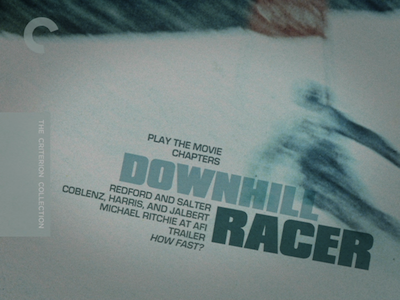
There are two parts to Downhill Racer. There is the part that is the racing, and there is the part that is the waiting for the racing. There is no in between.
The waiting for the racing is strange, incomplete, and quiet. No one says much. They do things, but at the same time, none of it is important. When it starts to get important, it distracts from the racing.
The racing is also quiet, but it's a different kind of quiet. It's isolated. Solitary. The main sound the racer hears is his skis on snow. The audio design for the movie is pretty incredible. When the skis catch air, the silence that occurs is definite. There is no other ambient noise. It's like flipping a switch to mute, and then contact activates the speakers again.
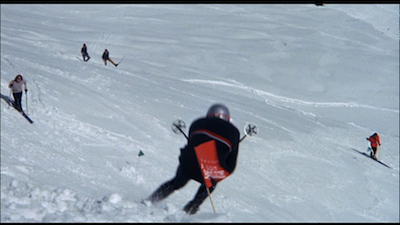
Downhill Racer is a 1969 film directed by Michael Ritchie and written by James Salter. It stars Robert Redford as David Chappellet, a contender from Idaho Falls, Colorado, a small American town that is far away from the European racing circuit that David is joining. David is one of two new members of the U.S. team, replacing another athlete whose injuries from a crash have taken him out of competition. David is an unknown, seemingly older than the other boys, and not a part of their network. His coach, Claire (Gene Hackman), apparently knows something about Chappellet that they do not. The time on his first run gives them an indication of what that is. The dude is fast.
David is confident and cocky--they are not the same thing. His confidence means he has enough belief to perform well, but the cockiness means he has the added belief that he can do anything. It makes him restless and inconsistent on the slopes, and it's the kind of thing that transfers over to his real life. He drives fast, and he chases girls just as quickly. He doesn't say much, just what he has to. This rubs his teammates the wrong way, but if they saw David going back home to the farm where he grew up the way we do, they might understand. It's a kind of American stoicism. David's father (Walter Stroud) doesn't even stop to greet him when the boy comes home, and he's not all that impressed with his Olympic aspirations. It's the only time we see David rattled. His old man's nonchalance and measured judgment clearly irritates him.
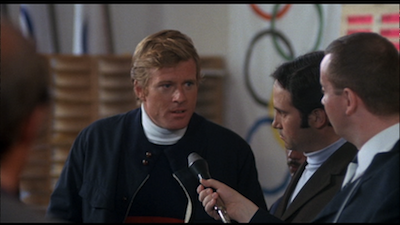
Which may also explain the appeal of skiing for Dave. His closest competition on the squad, Creech (Jim McMullan), complains to the assistant coach (Dabney Coleman) that David doesn't care about the team, and the coach replies that it doesn't really matter, it's not really a team sport anyway. It's not clear why Creech doesn't get that, it's obvious to us and we aren't up there racing. Michael Ritchie makes sure we see the action as close as possible to how the racer's see it, shooting the runs mostly from the skier's point of view. Noticeably, the first race, when we're supposed to be observing David and not yet climbing in his boots, is shot exclusively from an outside vantage point. It's exhilarating and disorienting, the way the camera rockets down the mountain. It gives the audience a glimpse of the kind of tunnel vision that can occur when descending the mountain.
Presumably, this is the sensation David is chasing. Not just the thrill of adrenaline, but the self-sufficiency and isolation. No need for small talk, and no room for the disappointment of others. It's just you and the snow. Sure, you can crash, but if you're racing just for you, who cares how that effects others? Win or lose, the time is yours.
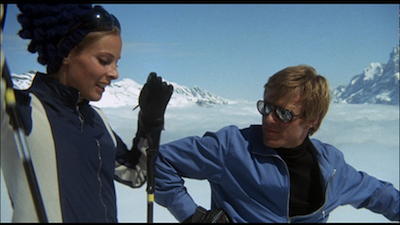
Downhill Racer is a strange film. It's certainly not like any other sports film I've ever seen. The plot tracks several seasons for the team, leading up to the Olympics, and though Ritchie depicts the jolt of the individual races, there is no real escalation from competition to competition. The opposite, in fact. The plot grows choppier and choppier, we move from peak to peak faster. If it weren't for a barely there subplot with a woman (Camilla Sparv) that David has an affair with, there would be no pause at all after that brief trip home. One can surmise that David is never going back to Colorado, so why spend any time away from the slopes.
The Olympics have their own tension. Ritchie creates an amped excitement in David's big run by ingeniously jumping from TV monitor to TV monitor in the pressroom as his time is counted off, one second per television. There is also another gut wrenching use of silence, as David and Claire watch to see if his closest competitor will manage to beat him. Even then, we aren't really rooting for David. The script has a third act hiccup, where his hubris causes damage, but outside of a nice scene-grabbing monologue that Salter writes for Gene Hackman, there's no push to make it seem like this is a mistake David must bounce back from. It's just another day out in the powder.
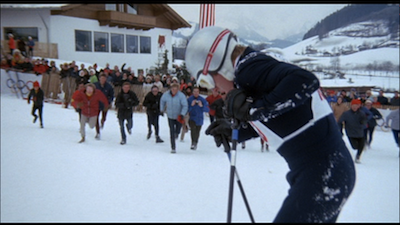
Released at the end of the 1960s, Downhill Racer is in every way a film of that era, and also points ahead to the maverick years coming in American cinema. Aesthetically, the movie is restrained, striving for realism and not reliant on traditional storytelling. Director of photography Brian Probyn (Badlands
Downhill Racer is also thematically in line with the dissatisfaction of 1969. This movie is about demystifying heroes. David Chappellet might ski with the letters U, S, and A printed on his helmet, but there is no patriotism to it. Indeed, the way Claire has to constantly hustle for money, it's not even like the home country is lending their skiers the full support of the national consciousness. David Chappellet is an anti-hero, a guy who only fights for himself. Ironically, I don't think anyone who wasn't as classically good looking as Robert Redford could have pulled it off. In the commentary on the recent release of Broadcast News [review], during the scene at the news director's party where William Hurt's character is seen struggling with eating a deviled egg, James L. Brooks says he believes that kind of dunderheaded gag is something that is only really funny with a handsome actor; if he was dumb and unattractive, it would veer toward being pathetic. Here, too, I think Chappellet needs a certain Hollywood charisma, the performer's inherent likability, to keep him from being just another asshole. Just like it takes a performer as down to earth as Hackman to play his foil. The same way Albert Brooks knows something is wrong with William Hurt in the Brooks movie, so too does Coach Claire know that Chappellet could blow it. In both cases, those guys also know what kind of success these flawed figures are likely to achieve.
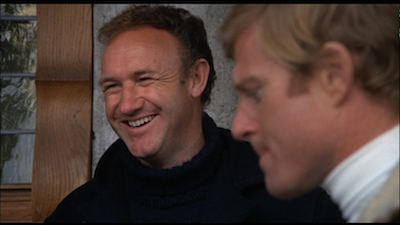
In a lesser movie, David Chappellet would find redemption. In Downhill Racer, there is only disappointment ahead. I don't want to give away which way the movie turns, that's something for you to experience, but I will say, there is no denouement. The results come in, and that's that, and I think we are meant to be unsatisfied. How did this man get here, and how did he achieve what he achieved? Good or bad, was it right? I would posit that this is a question that the culture was asking at the time, and by this point in the social movement that defined the 1960s, the question was no longer being asked of the government in so much as the counter-culture and the activists and, really, just about every citizen with a conscience, was asking him or herself. Even fighting the power has its pitfalls. David's father says it outright when his son boasts that one day he'll be champion: "The world's full of 'em."
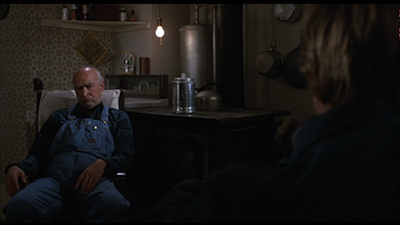
Downhill Racer trailer

1 comment:
One reason I like the film - other than the skiing element - is that it deals with a long view of sports competition. Not sports - but competition. Someone always wins and someone is always waiting in the wings to take the winners place. And it keeps on going.
One gets the feeling the main character doesn't ski because he likes it but because he is good. Many people do sports for this reason.
Post a Comment